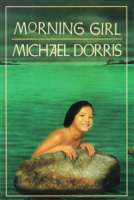
Morning Girl, who loves the day, and her younger brother Star Boy, who loves the night, take turns describing their life on an island in pre-Columbian America; in Morning Girl’s last narrative, she witnesses the arrival of the first Europeans to her world.
- ISBN: 9781562822842
- Author: Dorris, Michael
- Published: 1992 , Hyperion
- Themes: Indigenous, Siblings, Tainos
- Descriptors: Bahamas, Caribbean, Historical Fiction, Intermediate (ages 9-14), West Indies
- No. of pages: 80

I absolutely loved Morning Girl. I really appreciated how each chapter is titled by which character is speaking, it made it easier to understand that story line. I really appreciated how the story gave a connection between the characters name and why they have that name. I believe I would use this story in my classroom in order to introduce the Native American culture!
I appreciated the insight into the happenings of the Native Americans’ daily life and peaceful existence. The friction between the siblings is universal, but the coming of age for both was well written. This would be an interesting introduction to dicussing Christopher Columbus/Thanksgiving.
This little book is does a great job communicating life before the Europeans came and communicates the hardships that can take place when a new group of people come to a new place. I loved the relationship between Morning Girl and Star Boy. Their is always a struggle between siblings, but in the journey they find a better relationship.
I liked this book! I think that it would be a good book to read to my students to introduce them to Indians and history. I think that it would bring up good whole group discussions. I really enjoyed reading about the connection to her name in the book. This would bring out a good activity to do with my students. They can research the meaning of their names. The end of the book was sad.
I had trouble getting through this book. I felt like I had to work to get through because it is written in rhythmic metaphores. The ending was heart breaking. I think it shows how two people that come from two very different cultures have extreme goals in mind. One is with success and conquer and the other is genuine and friendly wanting to help. That simple moment where the Morning Girl and Christopher Columbus changed livers for generations to come.
I loved this story. I has always been fancinated with the origins of names and love how Native Americans often use nature and the personality of the individual to come up with the perfect name. I also appreciate how the siblings were portrayed as typical siblings arguing and teasing each other. I believe the ending allows for the opportunity for a great class discussion around the inaccuauracies in history. Don’t believe everything they tell you!!
Celina, “As an educator, we need to teach the truth and have students aware of true history events,” this is very true for educators today. Stories like Morning Girl can easily be implemented into the classroom and many diverse opportunities can arise from it. It can be shared whole group, small group, or a personal read. I will use this text in my own classroom to expose my students to indians and history. I enjoyed the story, and have found a visual representation intertextual book that brought this story to life for me and the students in my class next year. This quick read is both insightful and meaningful for implementing both culture and history. Salina, I did enjoy the “power of names,” aspect of this text and found many connections through that journey.
Morning Girl is a wonderful book that takes us back to 1492. The book is filled with lessons on families, expectations, and the power of names. The ending leaves you speachless and horrified. This is a must read for students in order for them to see the perspective of indians during this time in history.
This was an interesting and surprising book to read. I was engrossed while reading the entirety of the book. When I read the epilogue, I was saddened due to the historical facts of what happened when Columbus came to the “New World.” This would be a great book to use while compiling a text set on Europeans exploring and how they impacted many cultures. Of course, these were negative experiences. As an educator, we need to teach the truth and have students aware of true history events. This book could lead to many interesting conversations about history and the oppression of the people who were enslaved, saved, and ultimately conquered. It still amazes me that people celebrate Columbus Day. Yes, the day needs to be recognized, but students need to be taught the truth of what “Divine Destiny” means and how this impacted cultures around the world.